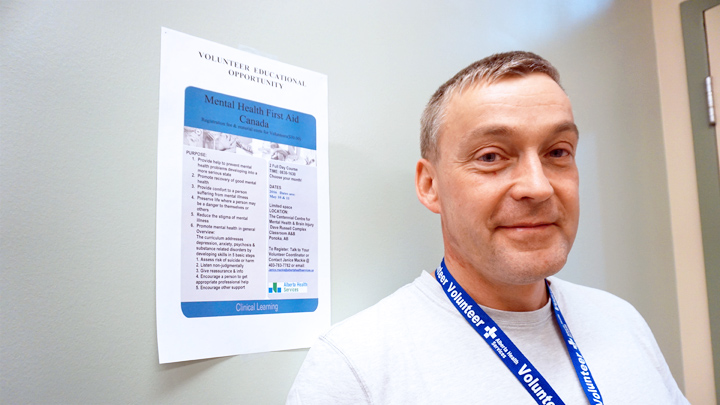
August 18, 2016

Registered volunteer Joseph Fell, who helps patients at the Centennial Centre for Mental Health and Brain Injury in Ponoka, is adding to his ability to provide support by taking the Mental Health First Aid certification.
Story and photo by Sarah Megran
First aid is far more than tending to physical wounds – it also helps heal the mind.
To that end, Alberta Health Services (AHS) volunteers are joining the growing number of Canadians getting their Mental Health First Aid (MHFA) certification.
“Anyone can be affected by poor mental health and anyone can learn the skills to recognize it and help,” says Janice Mackie, volunteer resource co-ordinator at the Centennial Centre for Mental Health and Brain Injury in Ponoka.
According to the Canadian Mental Health Association, at least one in three Canadians experience problems with their mental health each year. Positive mental health means finding balance in all parts of one’s life: social, physical, spiritual, emotional, financial, and mental. When this balance is upset or changed, it can often be a challenge to find that healthy balance again.
Currently the Centennial Centre has 10 volunteers who have taken the two-day course, and a growing number looking to enroll.
The MHFA training course was developed to help people provide initial support for someone who may be developing a mental health problem or is experiencing a mental health crisis.
Initially developed in Australia, the course is offered in Canada under the leadership of the Mental Health Commission of Canada.
One of the volunteers who has signed up is Joseph Fell.
“In this current economy, mental health problems are on the rise, so anything I can do to better my knowledge will be helpful,” says Fell, 42, who volunteers five days a week at the centre.
“The course will give me the confidence to apply this new knowledge directly with patients, as well as in my own social circle.”
And that is the goal of the course, says Mackie.
“Whether taking patients for a walk, assisting during mealtime or a having a simple conversation in the hallways, these volunteers will become more confident and conscious when interacting with our patients and their mental health needs,” Mackie says.
Noah Boakye-Yiadom, AHS Central Zone health promotion co-ordinator for Addiction and Mental Health, agrees with Mackie.
“These skills can be applied beyond health care facilities – family and friends who may also be suffering could require support from someone who has the compassion and understanding of mental health issues,” says Boakye-Yiadom.
“Raising awareness and educating more people about mental health will allow easier flow of conversations and less judgment to those that suffer from a form of mental health problems – in turn removing the stigma attached to it.
“This ultimately provides support and care needed to prevent further harm.”
For more information, visit mentalhealthfirstaid.ca.